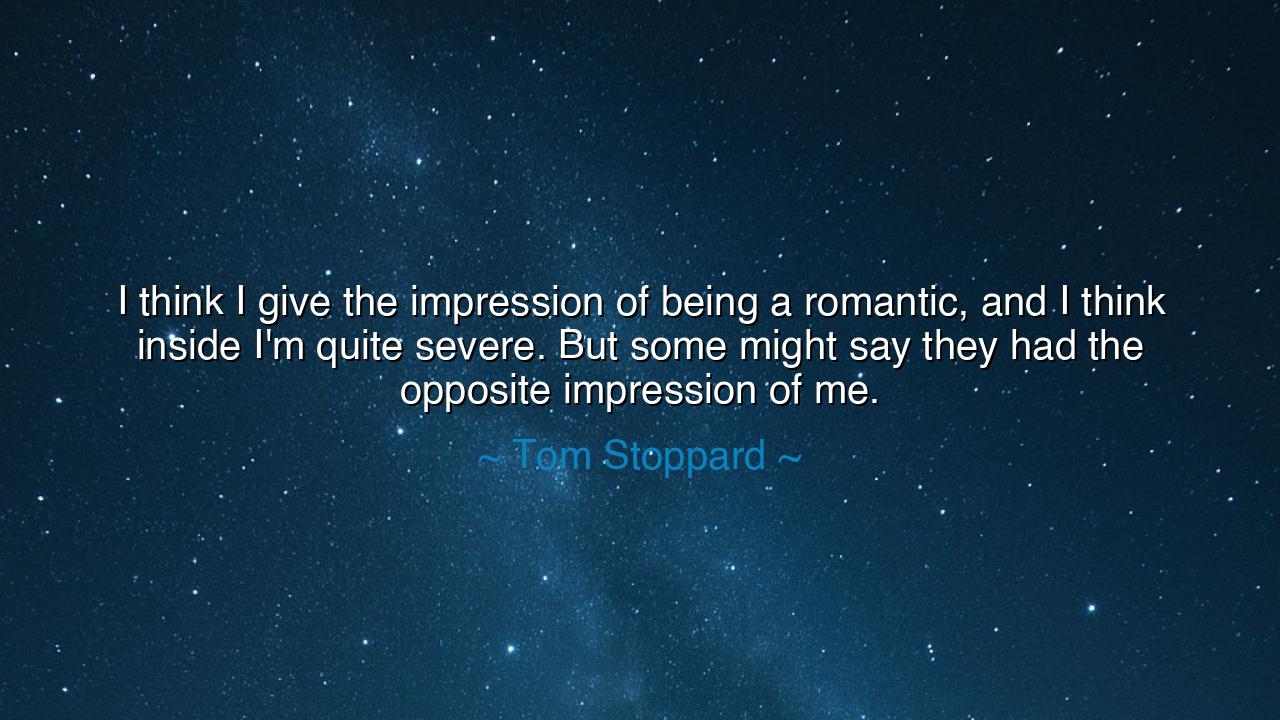
I think I give the impression of being a romantic, and I think
I think I give the impression of being a romantic, and I think inside I'm quite severe. But some might say they had the opposite impression of me.






"I think I give the impression of being a romantic, and I think inside I'm quite severe. But some might say they had the opposite impression of me." These words by Tom Stoppard reveal the paradox of the human condition—the tension between how we present ourselves to the world and how we truly feel within. The romantic is often seen as idealistic, soft-hearted, and consumed by love and beauty, while the severe person is associated with harshness, rigor, and discipline. Yet, Stoppard speaks of the dual nature within himself, where the external romantic persona contrasts sharply with an inner world of severity. His reflection invites us to contemplate the complexities of identity—how we may wear one mask to face the world, yet harbor within us a very different reality.
The ancient philosophers knew well the complexity of the soul and the tension between outward appearance and inner truth. Consider Socrates, the great Athenian philosopher. Outwardly, Socrates appeared as a humble, even eccentric figure, wandering the streets of Athens, engaging in lively conversations with the youth. Yet beneath this seemingly unassuming exterior, Socrates was deeply severe in his pursuit of knowledge and truth. His method of questioning was often rigorous and unyielding, pushing his followers to challenge their assumptions and confront uncomfortable truths. This contradiction between his appearance and his true nature mirrors the tension Stoppard describes—how the world may perceive us one way, yet we may feel and act differently on the inside.
In many ways, Stoppard’s romanticism can be seen as a mask that conceals the severity within. This duality is not merely a personal quirk but a reflection of the universal human condition: how we present ourselves to the world is often shaped by societal expectations, while our inner worlds are shaped by our values, fears, and desires. Theater, for example, has long been a realm where these contradictions play out on stage. The great actors of ancient Greece—such as Sophocles and Euripides—wove complex characters who embodied both romantic ideals and tragic flaws, often revealing how the external façade can be at odds with the inner self. Stoppard, as a playwright, similarly navigates this tension in his works, exploring the ambiguities of human nature.
Consider, too, the great literary figure Charles Dickens, whose works are filled with characters who embody both romantic longing and severe hardship. Characters like David Copperfield and Oliver Twist present outward appearances of innocence and vulnerability, but are often thrust into worlds that demand a rigorous survival instinct. Dickens understood the duality of the human experience—how romantic ideals can exist alongside the harsh realities of poverty, injustice, and personal sacrifice. Just as Stoppard's words suggest, the external perception of being a romantic can mask the severity of life’s struggles, but both elements coexist in the human experience.
This idea that romanticism can mask severity is also seen in the great leaders of history, who often had to balance idealism with realpolitik. Winston Churchill, for example, became known as a symbol of steadfastness and hope during World War II, embodying the romantic ideal of courage and resolve. However, Churchill’s leadership was also defined by a severe pragmatism—his decisions were calculated, sometimes harsh, and required sacrifices. His ability to inspire his people came not only from his romantic vision of victory, but from his willingness to make difficult and severe choices for the sake of the nation’s survival. Both aspects—romantic and severe—were integral to his leadership.
Stoppard’s self-reflection, then, teaches us that our identity is often a complex interplay between what we show the world and who we truly are within. This inner conflict is not something to be feared or rejected, but embraced as part of the human journey. The lesson to be learned here is that we should not be bound by the expectations of others or the roles society assigns us. Instead, we must recognize and accept the contradictions within ourselves, understanding that romanticism and severity can coexist and shape us in profound ways. Embracing our true selves, without the need for perfection or uniformity, leads to a fuller understanding of our nature and our purpose.
In our own lives, we must strive to balance our external persona with our inner truths. Like Stoppard, we may present a certain face to the world, yet our internal landscape may tell a different story. The key is not to force a harmonious match between the two, but to allow them to exist in a dynamic tension. Accepting the contradictions within ourselves and others allows for a deeper, more authentic existence. Let us not be afraid to show the romantic side of our hearts or the severity of our actions, for it is through this balance that we find both our strength and our humanity.






AAdministratorAdministrator
Welcome, honored guests. Please leave a comment, we will respond soon